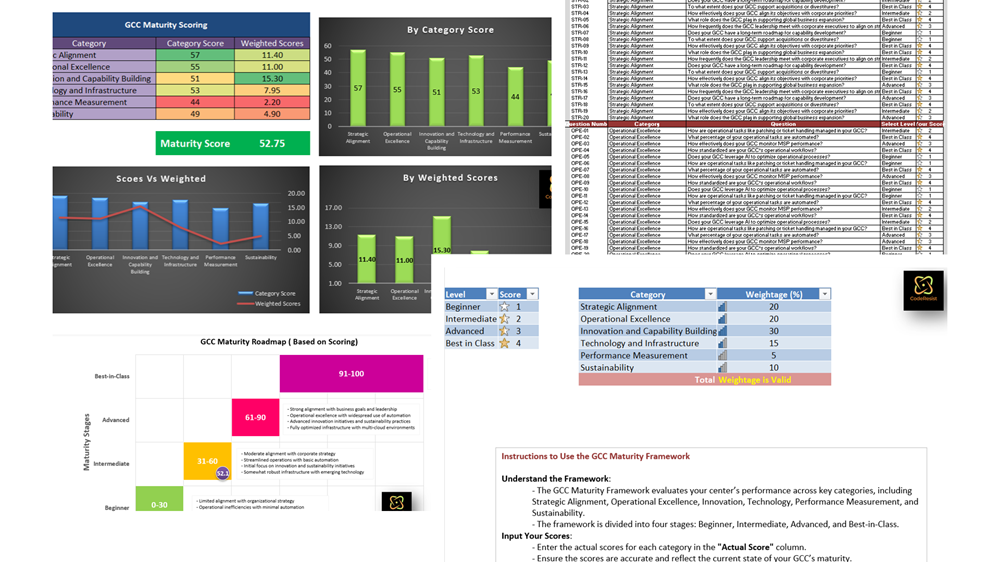Unlocking the Power of Global Capability Centers (GCCs): Your Guide to the GCC Maturity Framework
Global Capability Centers (GCCs) have become a cornerstone for organizations looking to centralize, optimize, and innovate their operations. As hubs of excellence, GCCs go beyond traditional outsourcing by providing high-value services, fostering innovation, and enabling digital transformation. But how do organizations measure and enhance the maturity of their GCCs? Enter the GCC Maturity Framework, a comprehensive tool to assess, strategize, and achieve operational excellence.
What Are Global Capability Centers (GCCs)?
GCCs are dedicated units within organizations that deliver services ranging from IT support and finance to innovation and R&D. These centers operate as extensions of the parent organization, focusing on driving cost efficiency, process standardization, and business transformation.
Key Statistics on GCCs:
- Global Adoption: According to a 2023 report, over 80% of Fortune 500 companies operate GCCs in strategic locations worldwide.
- Growth Rate: The GCC market is growing at a compound annual growth rate (CAGR) of 11.5%, fueled by advancements in AI, automation, and cloud technologies.
- Strategic Impact: 70% of organizations state that GCCs are pivotal for driving innovation and digital transformation.
Introducing the GCC Maturity Framework
The GCC Maturity Framework is a strategic tool designed to help organizations assess their GCC’s performance, identify gaps, and plan their journey to operational excellence. It evaluates GCCs across six critical categories:
- Strategic Alignment: How well does the GCC’s roadmap align with the parent organization’s goals?
- Operational Excellence: Are processes standardized and optimized for efficiency?
- Innovation and Capability Building: Is the GCC fostering innovation and upskilling talent?
- Technology and Infrastructure: How robust and scalable are the GCC’s technological capabilities?
- Performance Measurement: Are there effective KPIs and dashboards to track success?
- Sustainability: Is the GCC adopting eco-friendly practices and supporting global sustainability goals?
Join LInkedin Group – Global Capability Center- GCC Leaders Network (News, Trends, Insight and Opportunities)
Why Do We Need to Assess GCC Maturity?
Assessing the maturity of a Global Capability Center (GCC) is essential to ensure it operates as a strategic asset rather than just a cost-saving hub. GCCs are integral to driving innovation, enhancing operational efficiency, and enabling digital transformation. A maturity assessment provides a structured approach to understanding the current state of the GCC, identifying gaps, and charting a roadmap for improvement.
One of the primary reasons to assess GCC maturity is to align its goals with the overall organizational strategy. GCCs often operate in isolation, which can lead to a disconnect from the priorities of the parent organization. A maturity assessment bridges this gap, ensuring the GCC supports global business operations effectively and contributes to achieving corporate objectives.
Operational efficiency is another critical area addressed by maturity assessments. Without clear benchmarks, it can be challenging to determine whether processes are optimized. An assessment highlights areas for improvement, such as workflow standardization, process automation, and redundancy elimination, ultimately boosting productivity and cost-effectiveness.
For GCCs aspiring to evolve from cost centers to innovation hubs, a maturity assessment provides a clear framework. It guides the center in fostering innovation through advanced technology adoption, capability building, and talent upskilling. This transformation is crucial in today’s competitive environment, where GCCs are expected to deliver high-value services.
Stakeholder confidence is another significant benefit of assessing GCC maturity. Stakeholders demand measurable results and transparency. A structured assessment demonstrates accountability and progress, reinforcing trust in the GCC’s ability to deliver value. Furthermore, as organizations scale and face rapid technological advancements, a maturity assessment ensures that the GCC is future-ready, capable of adopting cutting-edge technologies like AI, cloud computing, and automation.
Benchmarking against industry standards is also a critical outcome of maturity assessments. These frameworks enable GCCs to measure their performance against peers and identify best practices to achieve Best-in-Class status. Additionally, as sustainability becomes a global priority, maturity assessments help GCCs integrate eco-friendly practices, aligning them with organizational and global sustainability goals.
Finally, a maturity assessment enhances decision-making by providing actionable insights. Leaders can prioritize investments, focus on critical areas, and make data-driven decisions to ensure the GCC’s continuous improvement and long-term success.
Why Use the GCC Maturity Framework?
Benefits of the Framework:
- Clear Roadmap: Provides actionable recommendations to progress from Beginner to Best-in-Class.
- Data-Driven Insights: Identifies strengths and areas of improvement.
- Strategic Alignment: Ensures the GCC’s goals align with the broader business strategy.
- Scalability: Adapts to the unique needs of any GCC, regardless of size or industry.
Four Maturity Stages
- Beginner (Score: 1-30):
Focus on foundational improvements.
Example: Standardizing workflows and introducing basic automation.
- Intermediate (Score: 31-60):
- Enhance capabilities and frameworks.
Example: Upskilling talent and adopting advanced technologies.
- Advanced (Score: 61-90):
- Optimize processes and lead innovation.
Example: Leveraging AI and multi-cloud environments.
- Best-in-Class (Score: 91-100):
- Drive transformative business outcomes.
Example: Becoming a hub for innovation and sustainability.
100+ Questions to Capture Voice of Stakeholders
Free GCC Maturity Framework and GCC Roadmap
How to Use the GCC Maturity Framework
1.Assess Your Current Stage:
- Use the framework’s scoring system to determine your GCC’s maturity level.
- Evaluate each category (Strategic Alignment, Operational Excellence, etc.).
2. Follow the Roadmap:
- Begin with actionable recommendations tailored to your current stage.
- Progress step-by-step to the next level.
3. Leverage Insights:
- Use performance metrics to track improvements.
- Align initiatives with organizational goals for maximum impact.
4. Repeat and Refine:
- Periodically reassess your maturity level to ensure continuous improvement.
In conclusion, assessing GCC maturity is vital for unlocking its full potential as a strategic asset. By evaluating alignment, efficiency, innovation, and sustainability, organizations can identify gaps, prioritize improvements, and drive transformative growth. A maturity assessment not only enhances operational excellence but also positions the GCC as a hub of innovation and long-term value creation. Start your journey today and lead your GCC to Best-in-Class status!
Are you looking for any support or advisory on GCC. Our team will be very hapy to assist you.
